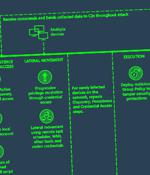Security News

Cybersecurity researchers have unearthed previously undocumented attack infrastructure used by the prolific state-sponsored group SideWinder to strike entities located in Pakistan and China. SideWinder has been known to be active since at least 2012, with attack chains primarily leveraging spear-phishing as an intrusion mechanism to obtain a foothold into targeted environments.

Iranian nation-state groups have now joined financially motivated actors in actively exploiting a critical flaw in PaperCut print management software, Microsoft said. The tech giant's threat intelligence team said it observed both Mango Sandstorm and Mint Sandstorm weaponizing CVE-2023-27350 in their operations to achieve initial access.

Beijing sent a message to foreign businesses this week when it launched an investigation into Shanghai-based Capvision Partners on the grounds of national security, accusing the consultancy firm of failure to prevent espionage. State-sponsored broadcaster China Central Television reported that the raid led to the arrest of a senior researcher from a large state-owned enterprise in China - for providing Capvision's foreign clients with intelligence.

It's March 2023 Patch Tuesday, and Microsoft has delivered fixes for 74 CVE-numbered vulnerabilities, including two actively exploited in the wild by different threat actors. "CVE-2023-23397 is a critical EoP vulnerability in Microsoft Outlook that is triggered when an attacker sends a message with an extended MAPI property with a UNC path to an SMB share on a threat actor-controlled server. No user interaction is required," Microsoft explained.

An unauthenticated remote code execution flaw is being leveraged by a Chinese state-sponsored group to compromise Citrix Application Delivery Controller deployments, the US National Security Agency has warned. "Targeting Citrix ADCs can facilitate illegitimate access to targeted organizations by bypassing normal authentication controls."

Miscreants broke into the Church of Jesus Christ of Latter-day Saints' computer systems and stole personal data belonging to "Some" members, employees, contractors and friends, the church has confirmed. According to a church statement on the "Data incident," posted on its website today, the security breach happened in late March 2022.

Microsoft on Friday disclosed that a single activity group in August 2022 achieved initial access and breached Exchange servers by chaining the two newly disclosed zero-day flaws in a limited set of attacks aimed at less than 10 organizations globally. "These attacks installed the Chopper web shell to facilitate hands-on-keyboard access, which the attackers used to perform Active Directory reconnaissance and data exfiltration," the Microsoft Threat Intelligence Center said in a Friday report.

66% of organizations have changed their cybersecurity strategy as a direct response to the conflict between Russia and Ukraine, while 64% suspect their organization has been either directly targeted or impacted by a nation-state cyber attack, according to Venafi. This Help Net Security video uncovers how exploiting machine identities is becoming the modus operandi for nation-state attackers.

Media organizations and journalists in the last years have been increasingly targeted by state-sponsored advanced persistent threat actors with a clear purpose: Obtain access to their sensitive information, spy their activities or even identify their sources. Zirconium, a threat actor also known as TA412, has been targeting American journalists since 2021.

An advanced persistent threat group, with ties to Iran, is believed behind a phishing campaign targeting high-profile government and military Israeli personnel, according to a report by Check Point Software. Targets of the campaign included a senior leadership in the Israeli defense industry, the former U.S. Ambassador to Israel and the former Deputy Prime Minister of Israel.